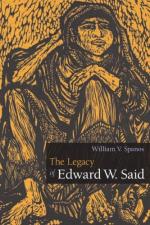|
This section contains 684 words (approx. 3 pages at 300 words per page) |

|
SOURCE: "After Oslo," in The New York Times Book Review, Vol. 101, January 28, 1996, p. 19.
In the review below, Smith generally praises the themes and tone of Peace and Its Discontents but notes that "the articles are dated."
An intellectual, says Edward W. Said, a professor of English and comparative literature at Columbia University, must be a rebel against prevailing ideas. In Peace and Its Discontents he follows his own precept well: few can match the pungency with which he challenges conventional wisdom on the Middle East peace process—the belief that it is an ineluctably good thing, threatened by self-evidently bad extremists.
Mr. Said mounts his challenge from high moral ground, having long favored a political solution to the Arab-Israeli conflict. But the Oslo compromise he finds contemptible. His people, the Arab-American argues fiercely, have been gulled into giving away their trump—Israeli desire for Arab recognition—for little...
|
This section contains 684 words (approx. 3 pages at 300 words per page) |

|


